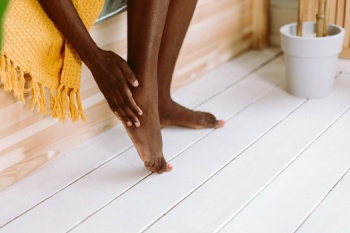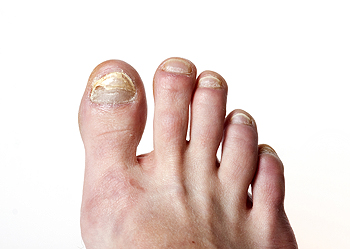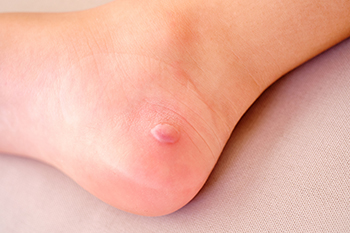Connect With Us
Blog
Causes and Symptoms of Heel Pain

Heel pain is a common issue that can significantly affect daily activities. The most frequent cause of heel pain is plantar fasciitis, which is an inflammation of the tissue that connects the heel to the toes. Symptoms typically include sharp pain in the heel, especially when taking the first few steps in the morning or after prolonged periods of sitting. Heel pain can also result from other conditions, such as Achilles tendonitis, heel spurs, or bursitis. Common causes include overuse, wearing improper footwear, obesity, or tight calf muscles. Treatment for heel pain often begins with conservative measures such as rest, stretching exercises, and wearing supportive shoes or custom orthotics. Nonsteroidal anti-inflammatory drugs can help manage pain and inflammation. In severe cases, a podiatrist may recommend corticosteroid injections, or even surgery to address underlying issues. If you have heel pain, it is suggested that you schedule an appointment with a podiatrist.
Many people suffer from bouts of heel pain. For more information, contact one of our podiatrists of Foot & Ankle Associates of Maine. Our doctors can provide the care you need to keep you pain-free and on your feet.
Causes of Heel Pain
Heel pain is often associated with plantar fasciitis. The plantar fascia is a band of tissues that extends along the bottom of the foot. A rip or tear in this ligament can cause inflammation of the tissue.
Achilles tendonitis is another cause of heel pain. Inflammation of the Achilles tendon will cause pain from fractures and muscle tearing. Lack of flexibility is also another symptom.
Heel spurs are another cause of pain. When the tissues of the plantar fascia undergo a great deal of stress, it can lead to ligament separation from the heel bone, causing heel spurs.
Why Might Heel Pain Occur?
- Wearing ill-fitting shoes
- Wearing non-supportive shoes
- Weight change
- Excessive running
Treatments
Heel pain should be treated as soon as possible for immediate results. Keeping your feet in a stress-free environment will help. If you suffer from Achilles tendonitis or plantar fasciitis, applying ice will reduce the swelling. Stretching before an exercise like running will help the muscles. Using all these tips will help make heel pain a condition of the past.
If you have any questions please contact our office located in Brunswick, ME . We offer the newest diagnostic and treatment technologies for all your foot and ankle needs.
Symptoms of Toenail Fungus

Toenail fungus is a common condition caused by fungi that thrive on the dead tissue of nails and outer layers of skin. It often starts from a fungal infection on the feet and is more common in toenails, particularly in older adults. People with diabetes, peripheral vascular disease, or weakened immune systems are at a higher risk, as are those who wear tight or non-breathable footwear. Symptoms of toenail fungus include thickened, brittle nails, white or yellow streaks, crumbling edges, and debris trapped beneath the nail. A podiatrist can provide an accurate diagnosis through a nail examination and laboratory tests to identify the type of fungus. Treatment options offered by a podiatrist may include prescription antifungal medications, laser therapy to target the fungus, or in severe cases removal of the affected nail. These treatments aim to eliminate the infection, which may take some time, and promote the growth of healthy nails. If you have developed toenail fungus, it is suggested that you schedule an appointment with a podiatrist for appropriate treatment.
If left untreated, toenail fungus may spread to other toenails, skin, or even fingernails. If you suspect you have toenail fungus it is important to seek treatment right away. For more information about treatment, contact one of our podiatrists of Foot & Ankle Associates of Maine. Our doctors can provide the care you need to keep you pain-free and on your feet.
Symptoms
- Warped or oddly shaped nails
- Yellowish nails
- Loose/separated nail
- Buildup of bits and pieces of nail fragments under the nail
- Brittle, broken, thickened nail
Treatment
If self-care strategies and over-the-counter medications does not help your fungus, your podiatrist may give you a prescription drug instead. Even if you find relief from your toenail fungus symptoms, you may experience a repeat infection in the future.
Prevention
In order to prevent getting toenail fungus in the future, you should always make sure to wash your feet with soap and water. After washing, it is important to dry your feet thoroughly especially in between the toes. When trimming your toenails, be sure to trim straight across instead of in a rounded shape. It is crucial not to cover up discolored nails with nail polish because that will prevent your nail from being able to “breathe”.
In some cases, surgical procedure may be needed to remove the toenail fungus. Consult with your podiatrist about the best treatment options for your case of toenail fungus.
If you have any questions, please feel free to contact our office located in Brunswick, ME . We offer the newest diagnostic and treatment technologies for all your foot care needs.
Plantar Warts Can Be Treated!
Blisters on the Feet

Blisters on the feet are often caused by friction, pressure, or irritation. Friction blisters, the most frequent type, typically form when ill-fitting shoes rub against the skin, leading to the buildup of fluid between layers of skin. Symptoms include redness, swelling, and the formation of a small, raised bubble filled with clear fluid. Blisters can be painful, especially when walking or standing. Common causes of blisters include new shoes, prolonged walking, or activities that cause repetitive rubbing, such as running. Excessive moisture or sweaty feet can also contribute to blister formation. A podiatrist can help by assessing the severity of the blister and offering safe and sterile wound care. If a blister is infected or causing persistent pain, this type of doctor may recommend drainage, dressing techniques, or the use of specialized footwear to prevent further irritation. Custom orthotics or padding may also be suggested to reduce friction. If you are dealing with this issue, it is suggested that you schedule an appointment with a podiatrist.
Blisters may appear as a single bubble or in a cluster. They can cause a lot of pain and may be filled with pus, blood, or watery serum. If your feet are hurting, contact one of our podiatrists of Foot & Ankle Associates of Maine. Our doctors can provide the care you need to keep you pain-free and on your feet.
Foot Blisters
Foot blisters are often the result of friction. This happens due to the constant rubbing from shoes, which can lead to pain.
What Are Foot Blisters?
A foot blister is a small fluid-filled pocket that forms on the upper-most layer of the skin. Blisters are filled with clear fluid and can lead to blood drainage or pus if the area becomes infected.
Symptoms
(Blister symptoms may vary depending on what is causing them)
- Bubble of skin filled with fluid
- Redness
- Moderate to severe pain
- Itching
Prevention & Treatment
In order to prevent blisters, you should be sure to wear comfortable shoes with socks that cushion your feet and absorb sweat. Breaking a blister open may increase your chances of developing an infection. However, if your blister breaks, you should wash the area with soap and water immediately and then apply a bandage to the affected area. If your blisters cause severe pain it is important that you call your podiatrist right away.
If you have any questions, please feel free to contact our office located in Brunswick, ME . We offer the newest diagnostic and treatment technologies for all your foot care needs.

